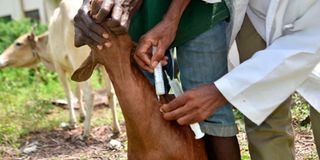Uasin Gishu issues anthrax disease alert, begins ring vaccination

The disease, first reported in a village in Megun location, is spreading quickly and the entire ward is now under surveillance by county veterinary officials.
Uasin Gishu County has issued an anthrax alert after some livestock collapsed and died following an outbreak of the highly infectious disease.
The disease, first reported in a village in Megun location, is spreading quickly and the entire ward is now under surveillance by county veterinary officials.
Animals in the location have been earmarked for vaccination.
Agriculture executive Samuel Yego said on Wednesday that an alert had been issued and vaccination against the disease had since started.
“We have begun a ring vaccination on the village where the cases were first reported and we shall from today (Thursday) commence vaccination across Megun ward,” he said.
“We are calling on residents to avoid any contact with the carcass lest they get infected with the disease and also report immediately to authorities any incidents of sick animals.”
He advised locals against handling carcasses with bare hands, urging them to burn them under the supervision of veterinary officers.
But anxiety has gripped the entire Megun location after six animals died in the past week. Locals fear many more might succumb to the disease because of failure by local administrators to vaccinate their livestock despite receiving reports of the sickness.
They now fear they might contract the bacterial disease because they have been touching the carcasses and some have even abandoned consuming animal products, especially milk.
Mr Wilson Kirui lost his two dairy cows in two days and now he is calling on the county government to immediately start vaccinating animals to save them from further losses and prevent people from getting infected.
Urgently conducted
“I lost my dairy cows worth over Sh140,000 and my fear is now people might get infected if the surviving animals are not urgently conducted,” he said.
“At the moment people are cautious about handling animal products and the majority have resorted to consuming black tea.”
Mr Kirui told the Nation that he was still burning the carcass of the second animal that died on Tuesday.
“On Monday I had ferried the carcass of one of the cows that died in the morning to the Eldoret veterinary lab and when the tests were done it was confirmed to be anthrax. Our concern now is the extent of the disease, because the majority of our livestock graze on communal fields,” he said.
Anthrax is caused by a spore-forming bacterium. It mainly affects animals.
Humans can become infected through contact with an infected animal or by inhaling microorganisms.
Symptoms depend on the route of infection. They can range from a skin ulcer with a dark scab to difficulty breathing. Symptoms start to show between one day and more than two months after infection.
Antibiotic treatment cures most infections. Inhaled anthrax is harder to treat and can be fatal.
At the home of Mr Daniel Mospei, farmhands carted away ashes from the shed where they had burned the carcasses of two dairy cows.
“I lost three cows worth over Sh300,000. It is a big loss because I was milking one of them 15 litres while two others were three months away from giving birth,” he said.
“I rushed to the veterinarian and bought vaccines to inoculate the remaining herd, including sheep, and save me from further losses.”
But he was worried because animals in his neighbourhood had not been vaccinated, posing more danger to his remaining herd.
“People have been haphazardly handling the carcasses and this poses a health risk. Fortunately, no one has consumed the meat because it would be disastrous,” he said.
But the situation at Mr Johana Tum’s homestead was different. His calf died but he assumed it was a minor illness, slaughtered it and fed the carcass to dogs.
“I never realised my calf was infected, because when I slaughtered it there were polythene bags in the rumen and I assumed that was the cause of death,” he said.
He asked county officials to immediately close all animal auctions to prevent the spread of the deadly virus to other regions.
“A majority of locals have inappropriately handled carcasses and we fear we may contract the disease. We are calling on the county administration to also consider giving us antibiotics against the disease,” he said.




